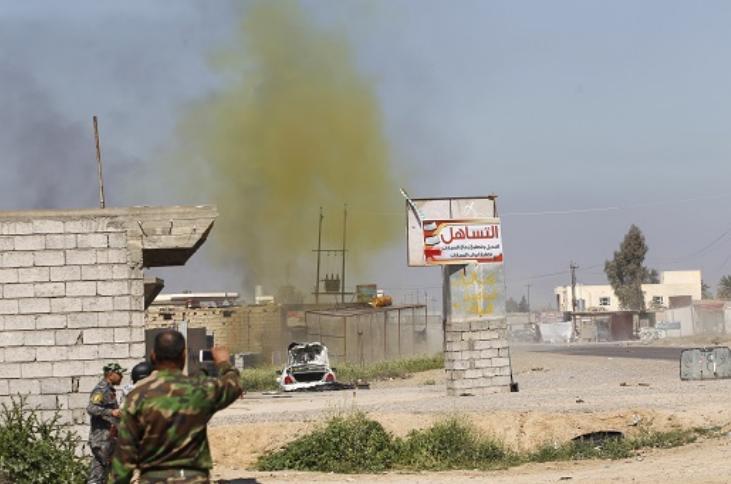
Facing the Challenge of Terrorists With Chemical Weapons
The communications revolution has made sharing information easier for everyone, including terrorists. One element to this is the proliferation of weapons technology that had previously been reserved for states. A prominent example in this regard is drones. A less prominent but perhaps more dangerous case is chemical weapons.
A Brief History of Chemical Warfare
Chemical weapons are probably most often associated in people’s minds with the First World War, and this was the origin point of chemical warfare in its modern sense. Chlorine is the best-known chemical agent used by the combatants in the Great War, but phosgene and sulphur mustard were more lethal.
Chemical weapons were also a major feature of the Second World War, with Zyklon B used by the Nazi government in Germany to carry out the industrial genocide against Europe’s Jews, and the Japanese government employing chemical munitions against the Chinese nationalists of the Kuomintang.
Since the war, only a small number of rogue actors in the international system have used chemical WMD.
In the 1960s, Egypt’s ruler Gamal Abdel Nasser used chemical weapons against civilian tribesmen during his disastrous intervention in Yemen.
The Soviet Union used chemical weapons in the 1980s, during its colonisation of Angola and its conquest of Afghanistan.
Also in the 1980s, Saddam Hussein launched repeated chemical attacks, mostly nerve agents like Tabun and Sarin, against Iran during their war and against Kurdish civilians within Iraq, most infamously at Halabja.
Finally, since 2011, the Iran-supported regime of Bashar al-Assad has repeatedly used chemical WMD against Syrian civilians, occasionally incurring some international penalties.
There was an international taboo against the use of chemical weapons even before 1914, yet the Chemical Weapons Convention that classified certain chemicals as weapons of mass destruction (WMD), to be dismantled and their use forbidden by treaty, was only enacted in 1997.
Terrorists’ Use of Chemical Weapons
Chemical weapons were first used by a non-state actor in 1990: the Liberation Tigers of Tamil Eelam (LTTE) or “Tamil Tigers” attacked government troops at a base on the east coast of Sri Lanka using chlorine. The LTTE, based among the Tamil Hindu minority, waged an insurgency against the Sinhalese Buddhist-dominated government of Sri Lanka from 1976 until the LTTE’s total defeat in 2009.
The LTTE became well-known for its brutality, particularly its use of suicide bombings, one of which murdered former Indian Prime Minister Rajiv Gandhi in 1991. Iran’s Hezbollah militia, the pioneer of suicide bombing, trained the LTTE in the tactic after the LTTE reached out to them following Hezbollah’s suicide attack against the U.S. and French Marines in Beirut in 1983, and the subsequent withdrawal of Western troops. Hezbollah would go on to train other terrorist groups in the use of suicide atrocities, notably the Kurdistan Workers’ Party (PKK) in Turkey and various Palestinian groups.
In June 1994, Sarin was used in Matsumoto in Japan against an apartment building. The targets of the terrorist attack were three judges who lived in the building and were about to rule in a criminal case against a group called Aum Shinrikyo (Supreme Truth), a Buddhist “End Times” cult that incorporated elements of Hinduism and Christianity within its ideology, believing its members to be the “elect” who would survive the oncoming Armageddon. The Matsumoto attack killed eight people and wounded about 250.
The best-known use of chemical weapons by a terrorist group until recent years was also by Aum Shinrikyo, in March 1995, releasing Sarin on the Tokyo subway system, killing thirteen people and wounding hundreds more.
Al-Qaeda was known to have acquired and tested chemical WMD on a small scale in Taliban-ruled Afghanistan in the 1990s, and Al-Qaeda’s branch in Iraq, Ansar al-Islam, which was later absorbed by the Islamic State (ISIS), had developed chemical weapons in the early 2000s, during Saddam’s time in power. Al-Qaeda thankfully was never successful in using chemical WMD, but ISIS has made regular use of such weapons over the last two decades.
The Islamic State and Chemical Weapons
ISIS—known as Al-Qaeda in Iraq until 2006—gained access to Saddam’s chemical stockpiles in the early years after the 2003 Anglo-American invasion because the jihadists worked closely with the Ba’athists of the former regime who dominated the insurgency up to 2005. ISIS repeatedly used these chemical WMDs, such as sulphur mustard, to attack Coalition troops and civilians. From as early as 2004, and especially in the 2006-2007 period, ISIS also made use of chlorine.
ISIS has plotted to use chemical terrorism abroad. In June 2004, Jordan disrupted a major ISIS plot to use a variety of chemicals for a massive bombing in Amman. More recently, ISIS was planning chemical attacks in Europe.
Since ISIS declared its “caliphate” in 2014, it has invested significant resources in its special department to develop chemical weapons, which has existed since 2002 and was and remains significantly staffed by former officials from Saddam’s WMD program. ISIS has tested chemical weapons on humans, and used them widely against U.S. and allied troops. Some members of ISIS’s WMD department have been captured, killed, and sanctioned by the United States.
With the demise of the “caliphate”, developing chemical weapons has become more difficult for ISIS: even developing small amounts of chemical WMD requires significant industrial infrastructure, and without territory to govern such infrastructure is not reliably available.
Conclusion
At the present time, the most serious chemical terrorism threat comes from ISIS: they have used them on a fairly large scale, and they retain access to materials and expertise drawn from the former Saddam regime. Without the “caliphate”, however, it is difficult for ISIS to combine its stockpiles and knowledge to create chemical weapons on a significant scale. Ensuring that ISIS cannot recapture territory is, therefore, an important security priority in terms of denying terrorists access to chemical WMD, because in today’s interconnected world such weapons would soon spread.
Source: eeradicalization





